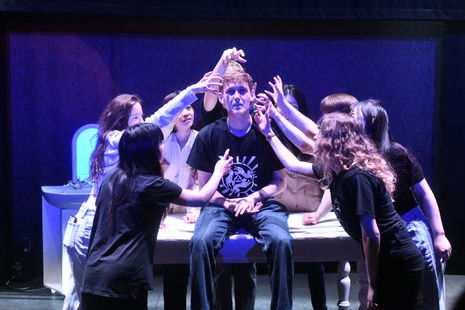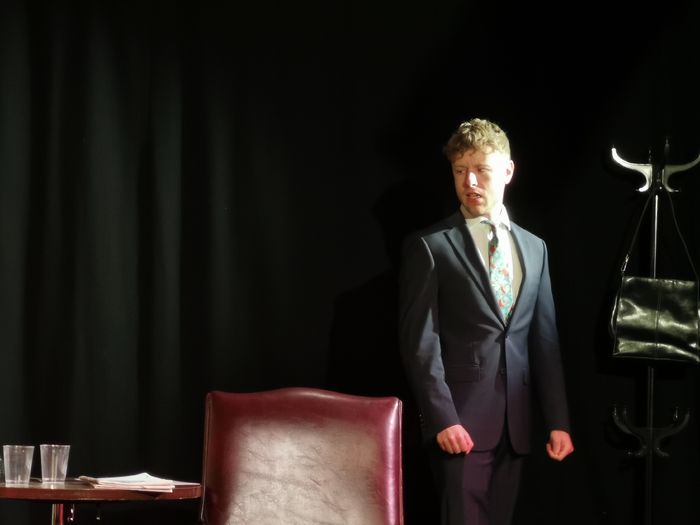‘Mnemonic’ neatly spans both space and time
This ambitious undertaking aims for the stars, and lands more often than it misses

Those of you who took GCSE drama, or who at least had the bad luck to witness it from a distance, may find your hearts sinking at the notion of seeing a ‘devised’ performance. The word tends to call to mind unfortunate attempts at physical theatre, clumsy handling of political or philosophical themes and, more often than not, a gratuitous amount of either death or sex among the characters.
“It’s a breathtakingly intelligent show”
Mnemonic, originally conceived and devised by the renowned theatre company Complicité, and directed in this case by Sophie Howe, does much to challenge this idea. The play itself, which melds the story of a mysteriously split couple in 1990s Britain and the life and death of Ötzi, a Copper Age man who died on the border of Italy and Austria only to be discovered as a mummy thousands of years later, is absolutely remarkable. It skilfully weaves together a kaleidoscopic array of voices, stories and modes of communication in a prismatic exploration of the sprawling shape human lives can take — and the sprawling gaps they can leave behind. The cast, which is only nine members strong, makes good work of filling the stage, moving through scenes at breakneck speed with a pleasant fluidity, making what is certainly a heroic, and at least mostly successful, attempt to rise to the frenetic multilingualism of the dialogue.
That being said, though the ambition and breadth of the production deserve much praise, the performance is not without its resemblances to the preconceptions one might hold about devised theatre. The choreographed aspects were neat and mainly went off without a hitch, but lacked the crucial precision and polish that make physical theatre such a gamble. At times, especially towards the beginning, some cast members delivered a slightly overwrought take on the self-consciously zany dialogue, struggling to walk the line between the script’s subtly surreal humour and the very real human behaviours and emotions that underpin it, ultimately undermining the integral humanity of the play rather than reinforcing it. Also worth a mention is some of the slightly uncomfortable accent work, which one cannot help but feel a little grated by.
“It skilfully weaves together a kaleidoscopic array of voices”
The cast noticeably warmed up throughout the performance, though, which bodes well for the rest of the run. They comfortably rose to the occasion of the more climactic scenes, with Sam Benatar (Virgil; pictured above) in particular seeming to hit his stride and delivering solidly in a role demanding in both its volatility and its vulnerability. Rosalind Wippell, too, did an impressive job of navigating the rollercoaster journey endured by her character Alice, and the ensemble accompanying her on her journey throughout the Eastern Europe of the 1990s definitely deserve a mention for their agile leaps between settings as varied as a Greek graveyard, a Berlin streetscape complete with raving monologues in German, and a sleazy bar in Riga. Despite its sweep across European history and geography, the production makes excellent use of recurring visual and aural motifs, and does not shy away from moments of silence and stillness which mark an excellent contrast to the often frantic nature of the play.
The actors were buoyed along by the fantastic work done by the production team. The lighting design is inspired, easily expanding and shrinking the world of the stage in creative and innovative ways, competently facilitating the rapid switches between small, intimate scenes and those that encompass entire train stations, hospitals, and even multiple spaces simultaneously. The set is elegantly minimalistic and mobile, and though Complicité’s signature “turbulent forward motion” sometimes left actors scrambling to move set pieces from place to place, it was absolutely worth it for the liminality and adaptability it lent to the staging. Sound, though prone to the occasional abrupt cut, was tight and clean, and supplied a transcendent quality that aided the play’s relentless questioning of the movement of time and the strange ways it wears on everyone and everything.
Overall, anyone who wants their ideas about devised theatre to be challenged would do well to see Mnemonic. It’s a breathtakingly intelligent show, throbbing with unvoiced questions and unexhumed emotion, with the ability to span millennia and thousands of miles in the blink of an eye. While the production’s slight lack of poise means that it certainly isn’t perfect, it’s playful, tactile and earnest. Its ambition, though perhaps not fully realised, is amply rewarded, and the play deftly evokes questions about time and space in tandem, alternately holding them tight and throwing them to the wind for characters and audience members alike to chase after.
Mnemonic is showing at the ADC Theatre from Tuesday 2nd to Saturday 6th May, 7:45pm.
 Comment / Plastic pubs: the problem with Cambridge alehouses 5 January 2026
Comment / Plastic pubs: the problem with Cambridge alehouses 5 January 2026 News / Cambridge businesses concerned infrastructure delays will hurt growth5 January 2026
News / Cambridge businesses concerned infrastructure delays will hurt growth5 January 2026 News / New movement ‘Cambridge is Chopped’ launched to fight against hate crime7 January 2026
News / New movement ‘Cambridge is Chopped’ launched to fight against hate crime7 January 2026 News / AstraZeneca sues for £32 million over faulty construction at Cambridge Campus31 December 2025
News / AstraZeneca sues for £32 million over faulty construction at Cambridge Campus31 December 2025 Interviews / You don’t need to peak at Cambridge, says Robin Harding31 December 2025
Interviews / You don’t need to peak at Cambridge, says Robin Harding31 December 2025










